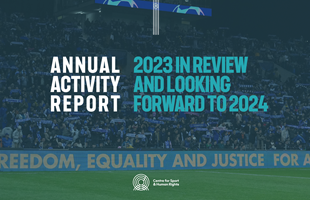The Governance Legacy of Mega-Sporting Events: A Golden Opportunity to Promote Human Rights
07 Dec 2018
Author - Andy Spalding

Human rights’ next of kin is the global anti-corruption movement. These two efforts increasingly work in tandem, creating the conditions in which humans flourish. Their synergy has at least two explanations. Most obviously, we know that corruption enables the violation of long-recognised rights, be they rights to due process, education, an adequate standard of living, or others. More deeply, we might understand freedom from official corruption as a free-standing human right. Intellectual traditions from diverse regions of the world have long viewed this freedom as an entitlement of each and every citizen, even where (or especially where) governments egregiously abridge it. Indeed, the notion that public officials ought not to abuse their office for private gain may be the closest thing we have to a truly cross-cultural political value.
"The notion that public officials ought not to abuse their office for private gain may be the closest thing we have to a truly cross-cultural political value."
This partnership is finding uncommon success in an unexpected arena: mega-sporting events. Given sport’s track record of repeated human rights and corruption violations, this claim may at first seem preposterous. But a transformation is now taking place, one which few notice but most will welcome. The positive potential of sporting events to leave a human rights legacy, including through an enhanced culture of good governance, will be discussed from multiple perspectives during the upcoming Sporting Chance Forum in Paris. The Paris location has some significance beyond recognising the anniversary of the UN’s adoption of the Universal Declaration of Human Rights at the Palais de Chaillot some 70 years ago; it is precisely the opportunity afforded by the 2024 Olympic and Paralympic Games that offer a tipping point, with the historic convergence of three events.
"The opportunity afforded by the 2024 Olympic and Paralympic Games offers a tipping point, with the historic convergence of three events."
First, the International Olympic Committee made game-changing revisions to its host-city contract. For the first time in history, the IOC would require the host city, Organising Committee, and National Olympic Committee to implement all applicable anti-corruption and human rights laws and standards during the Games’ seven years of preparations.
While the IOC was developing these policies at its headquarters in Switzerland, the second key event was occurring just next door. Completely unrelated to the Olympics, France was adopting two landmark statutes. The first was the Loi Sapin II, which imposes new obligations on public and private entities to adopt anti-corruption compliance. The second was the Duty of Vigilance Law, creating obligations on large companies to adopt and report human rights monitoring measures. France too understood the kinship of the human rights and anti-corruption causes. With Sapin II, France became a full-fledged member of the global anti-corruption compliance movement; with the Duty of Vigilance Law, and the effort to protect human rights from corporate violations, France became the undisputed world leader.
"The positive potential of sporting events to leave a human rights legacy, including through an enhanced culture of good governance, will be discussed from multiple perspectives during the upcoming Sporting Chance Forum in Paris."
These two developments, each significant on its own, would then intersect in one dramatic (but underappreciated) moment. This same year - 2017 - the IOC awarded the 2024 Summer Olympics to Paris. A country already swept up in an anti-corruption and human rights movement was thus invited to set the new standards for Olympic host-city governance.
These new measures will surely help the Games become better governed, but so too can they achieve something more. In mega-sport circles, there has long been talk of the various potential legacies of sport: the lasting economic, cultural, or environmental benefits (or harms) of hosting the Games. But with the new IOC contractual provisions, as applied in France, we see a new kind of legacy emerging. Let’s call it a governance legacy: a series of laws, practices, standards, or norms promoting integrity, transparency, accountability, and the protection of human rights, that have application beyond sport and will remain in place after the Games are gone.
"The Olympics are becoming a catalyst to the adoption of better practices and higher standards."
These new laws, practices, standards or norms need not originate with the Games to constitute a legacy; in France, Sapin II and Duty of Vigilance were obviously not adopted specifically for the Olympics. But where the Games accelerate these laws' implementation, it's a legacy nonetheless.
We see this legacy already taking shape. French entities are adopting more stringent measures than French law otherwise requires. The Olympics are thus becoming a catalyst to the adoption of better practices and higher standards. To the extent these norms and practices remain in place after the Games are gone, they’ll create a governance legacy.
And consider the potential impact of the entities that organise to deliver the Games. Every Olympic host city forms an Organising Committee for the Olympic Games, or in French, a Comité d'organisation des Jeux olympiques (“COJO”). Though small now, the Paris 2024 COJO will eventually hire upwards of 5,000 paid employees and 17,000 volunteers. Let's imagine these individuals being trained to perform their jobs while honouring basic anti-corruption and human rights norms. When the Games end, where will these people go? Back into business, government, law, and elsewhere, bringing their newly shaped beliefs and habits with them. That’s 22,000 seeds of anti-corruption and human rights compliance sewn across multiple sectors of French society, planted by Olympic preparations.
"Should the Olympics produce governance legacies in each of these countries, they may begin to shed their reputation as an unmitigated source of corruption and human rights abuse."
The long-term impact of these reforms will reach well beyond France. Los Angeles, host of the 2028 Summer Olympics, has signed a contract with identical anti-corruption and human rights provisions; the U.S. will have no choice but to follow France's example. So too are these provisions included in the draft contract for the 2024 Winter Olympics, now set to be awarded either to Stockholm or Milan. Should the Olympics produce governance legacies in each of these countries, they may begin to shed their reputation as an unmitigated source of corruption and human rights abuse. Having long been part of a worldwide problem, they may now become part of the solution.
***
Andy Spalding is Professor of Law at the University of Richmond (Virginia, USA) and Chair of the Olympics Compliance Task Force. He welcomes questions or comments and can be reached at [email protected].
Photo: Flickr/Singapore Olympic Youth Games



